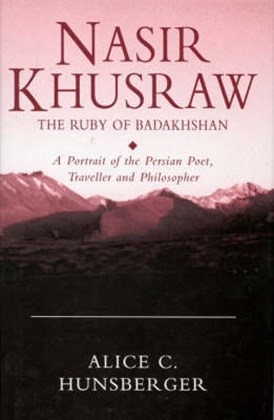Nasir Khusraw, the Ruby of Badakhshan A Portrait of the Persian Poet, Traveller and Philosopher
I.B. Tauris in association with the Institute of Ismaili Studies
This book is also available OPEN ACCESS to download or read online for free.
One of the foremost poets of the Persian language and a major Ismaili thinker and writer, Nasir Khusraw has attracted passionate attention, from critics and admirers alike, for nearly a thousand years. Celebrated for a poetry that combines art with philosophy, trusted for the details of his travels throughout the Middle East, revered and criticised for his theological texts, Nasir Khusraw remains one of the most fascinating figures in Islamic history and literature.
Born in 1004 in the eastern Iranian province of Khurasan, Nasir Khusraw rose to prominence in the courts of the Ghaznavids and the Saljuqs. Amidst this overwhelming pomp and luxury, he began to question his surroundings and search for a truth that would transcend life's outward form. Following a spiritual crisis (which he relates in the most beautiful prose and poetry), he converted to Ismaili Shi'ism and set off on a journey to Mecca that was to last seven years. He spent three of those years in Cairo, then under the rule of the Fatimid Caliph-Imams, where he was appointed the hujjat or head of the Ismaili da‘wa (mission) to Khurasan. Returning home, Nasir Khusraw encountered severe persecution from anti-Ismaili religious scholars, which compelled him to seek refuge in a remote part of the Pamir Mountains in Badakhshan, where he composed most of the works that we have today.
This is the first comprehensive study of Nasir Khusraw to appear in English. Structured around the progress of his journey, and drawing extensively on Nasir Khusraw’s own philosophical and poetic writings, it provides a highly readable and insightful account of this great scholar, sage and traveller. His writings, many of which are translated here for the first time, reveal a man of intense emotion and deep attitude to his faith, whose social awareness, cultural commitment to his homeland, and unstinting pursuit of excellence form the human backdrop to what was also a literary genius and a brilliant mind.
Nasir Khusraw will appeal to students and scholars of Ismaili studies and Persian literature, as well as those interested in early Islam, world religions, literature, medieval history and early travel writing.
List of Illustrations
Preface
Acknowledgements
Note on the Text
Chronology
Map of Nasir Khusraw’s Journeys
1. A Soul Higher Than Fortune
2. Heretic, Magician or King?
3· The Wonders of This World
4· The Turning Point
5· Knowledge and Action
6. The Journey Begins
7· Jerusalem, the Holy
8. The Splendour of Fatimid Cairo
9. Mecca, City of Pilgrimage
10. The Journey Home
11. The World Turns Dark
12. Glory Regained
Notes
Bibliography
Index
‘Here, at last, is a book that succinctly introduces the Ismaili poet and da‘i (missionary) Nasir-i Khusraw to the general reader, to his students, and to academics.’
– Edebiyat: Journal of Middle Eastern Literatures
‘...Hansberger's book maintains the balance between being highly informative and pleasantly readable.’
– Middle East Studies
Alice C. Hunsberger holds a doctorate in Persian and Arabic literatures from Columbia University. Currently a Visiting Research Fellow at The Institute of Ismaili Studies in London, she has previously taught history, philosophy and religion at Hunter College and at Queens College (both in New York), as well as at the University of Technology in Isfahan. Dr Hunsberger is presently working on an English translation of Nasir Khusraw’s Divan.

